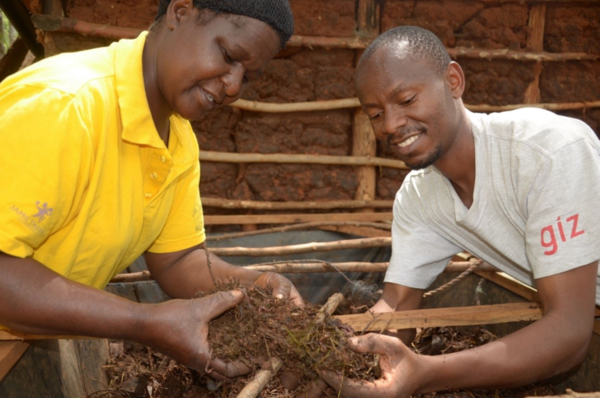- Share this article
- Subscribe to our newsletter
Kenya – "Quick-Win" solutions as an alternative to mineral fertilisers
According to the International Food Policy Research Institute (IFPRI), an additional 120,000 rural people are estimated to fall below the national poverty line of 30 USD as a result of fertiliser disruption alone. The Kenyan Government has undertaken significant investments to subsidise fertilisers but is yet to meet 20 per cent of the projected demand. Most farms in Western Kenya rely heavily on mineral fertilisers to produce maize and beans, the main staple crops in the region. In view of the current price peaks for fertiliser, local traders shy away from stocking mineral fertilisers, making the latter a scarce and expensive resource for the farmers.
The GIZ PRoSoil project
It is in the crisis that the agroecological soil management measures promoted by the project “Soil Protection and Rehabilitation of degraded Soils” (ProSoil), implemented by Deutsche Gesellschaft für Internationale Zusammenarbeit (GIZ) on behalf of the German Federal Ministry for Economic Cooperation and Development (BMZ), prove to be a way out. These include a broad range of short- and long-term practices that allow farmers to raise productivity while increasing use-efficiency and reducing the quantities of external inputs. Among the "quick-fixes" for degraded soils are vermi-compost and agricultural lime. Both raise soil pH and are therefore highly effective in unlocking nutrients within the acidic soils that are widespread in Western Kenya.
Moreover, vermi-compost improves the soil structure and biological activity – key indicators for healthy soils. Many households can access the readily available local raw materials required to undertake vermi-composting. With the consecutive application of vermi-compost and biofertiliser generated during the composting process, farmers have been successful in replacing the common sequence of fertiliser application in maize production.
Special funds availed by BMZ to mitigate the global impacts of the Ukraine war are currently being used by ProSoil Kenya to scale out demonstrations on soil testing, lime application and vermi-compost production among more than 450 groups of smallholder farmers. This is accompanied by trainings on agro-forestry to enhance the medium- and long-term availability of biomass needed to produce compost.
Since the onset of this initiative last July, the capacities of more than 3,000 households have been enhanced, and in return, smallholders have managed to apply these soil restoration measures on their farms with good indications. The field-based trainings are complemented by a series of radio broadcasts targeting about 50,000 listeners for enhanced outreach. This is aimed at creating additional interest and demand for the swift rehabilitation of degraded soils that supports farmers in cushioning themselves against the ongoing fertiliser crisis.
Flora Ajwera, Dennis Mucee Ncurai, David Kersting (Global programme “Soil protection and rehabilitation for food security”, Deutsche Gesellschaft für Internatioanle Zusammenarbeit (GIZ), Kenya





Add a comment
Be the First to Comment